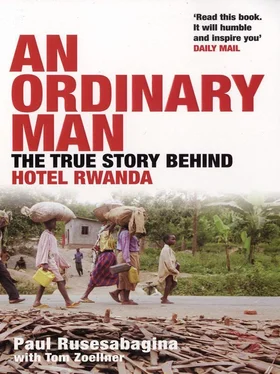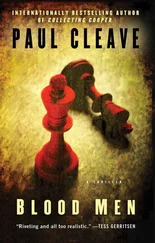According to tribal lore the bloodline of the mwami had a heavenly origin. If there was a dispute over succession the true king was supposed to be known by being born with the seeds of a squash plant clutched in his tiny fist. A court of royal advisers known as the abiru would reveal the successor when the current king died. They were also the guardians of the obscure poems, songs, and stories that comprised a kind of underground national history. It was a long account of violence and royal assassinations and illicit sex; in short, the failings of past kings and queens, the kind of history that doesn’t flatter. It was known by a Kinyarwanda word, which is roughly translated as “gossip.” If you were trusted with the gossip it was a signal that you were now a part of the inner circle. In Rwanda, political power has always been linked with control of history.
Kings were the ultimate guardians of the past and of power and they were supposed to watch over everybody with equal favor. They fielded extremely tough armies with excellent archers. As a result, we were one of the only regions in Africa where Arab and European slave traders were never able to conduct raids, and so almost none of our people were sold into bondage. One of our ancient kings-a ruler named Gihanga-was supposed to have discovered fire. A flame burned in his memory at the royal court until the monarchy finally ended in 1959. I’ll say more about that event later, but it is important to know now that the early kings and all the advisers that surrounded them were generally the taller people in the tribe. This established a legend just as colorful as the squash seeds I mentioned, but one that would be infinitely more damaging.
It is well known that the main ethnic groups in modern Rwanda are the Hutu and the Tutsi, but it remains a matter of controversy if these are indeed two separate races or if that is just an artificial political distinction created in a relatively short period of time. Evidence points to the latter. We share a common language-the beautiful tongue of Kinyarwanda-the same religions, the same children’s games, the same storytelling traditions, the same government, even, in most cases, the same outward appearance. We also had a strong idea of our hilly land as a unified nation and a pride in ourselves as tough warriors for the mwami. There was never any “Hutu homeland” or “Tutsi homeland.”
What divided us was an invented history.
The false-but very common-explanation for our origins is that the Hutus are a wandering offshoot of the huge group of Bantu-speaking people who have occupied Central Africa for thousands of years. They were said to have come into the country from the west. The Tutsis, on the other hand, are supposed to be descendants of the taller peoples of the Ethiopian highlands near the headwaters of the Blue Nile. They were supposed to have invaded Rwanda from the north about five hundred years ago and established the mwamis government. Or so the story went. But there is no real evidence for it, and most scholars now think that it is pure invention. We will probably never know for certain. Africa ’s traditional history is one passed down through poems and genealogies and heroic ballads in which people, not places, are the emotional focus. So many specific details about geography and migration patterns are lost in the fog of time.
One influential man who helped create the “Tutsis from the Nile” theory was British explorer John Hanning Speke, who is given credit for being the first white man to lay eyes on Lake Victoria. He made some superficial observations about the people he came across during his expeditions in Central Africa and connected them with stories in the Bible. In his 1863 book, Journal of the Discovery of the Source of the Nile, he showed a strange fixation with an extended clan of leaders in what is now present-day Rwanda. These people-they called themselves Tutsis-measured their wealth in cows, drank milk, ate beef, and seemed to be taller and have slightly more angular noses than their subjects, who fed their families by growing cassavas, sweet potatoes, and other vegetables. Speke theorized that they were actually a lost tribe of Christians who had migrated from the deserts of the Middle East and were therefore the carriers of a noble line of blood. The Hutu-what Speke called the “curly-head, flab-nosed, pouch-mouthed negro”-was a different story. The name itself means “one who works, ” and Speke thought there was a divine purpose behind the differences in lifestyle. Those who grew crops, he said, were probably the distant descendants of Noah’s son Ham, who according to the ninth chapter of Genesis had committed the sin of looking at his father lying naked in a tent when he, Noah, was drunk on homemade wine. For this transgression Noah cursed his son Ham’s descendants for all time.“The lowest of slaves will he be to his brothers, ” said the man who had captained the ark through the floodwaters. And, to Speke’s way of thinking, these poor lowborns had obviously found their way to exile in Central Africa and had reproduced themselves by the millions. The Hutus were part of that accursed lot, and this explained their generally subservient role to the cattle-owning Tutsis, even though the two groups of people looked quite similar on the surface.
All of this is, of course, total European foolishness, but what came to be called the “Hamitic hypothesis” carried a surprising amount of weight in the late nineteenth century, just as the great powers were preparing to carve up Africa into colonies. These ideas about race were to become more than fanciful stories told over port at the Royal Geographic Society but an actual template for governing us. The real origin of Rwanda ’s class system had almost nothing to do with physical characteristics. It was much more banal than anything the European gentlemen explorers had been able to imagine.
What seems to have happened was that the ministers and priests closest to the Rwandan king started to conceive of themselves as being a special class of people, in much the same way that large landowners in what is now Great Britain or France began to call themselves lords and dukes and earls. In precolonial Rwanda, however, it wasn’t land that was used to reckon a person’s wealth. It was cows. Those who didn’t have cattle were forced to turn to growing crops for sustenance and took on the identity of Hutu, or “followers”. Many acquired cows by applying to a local strongman and agreeing to pay an annual tribute of grain and honey beer and pledging to defend him in times of war. These client relationships were known as the code of ubuhake and became the glue of the Rwandan social hierarchy.
Intermarriage between the Tutsi and the Hutu was not unheard of, but it was also not the norm. Those taller frames and aquiline noses that John Hanning Speke had fallen in love with were probably the result of just a few hundred years of sexual selection within that particular caste group. This deluded love affair, as you might guess, was soon to become the cause of great misery. I experienced it for the first time when I was nineteen years old.
My best friend, Gerard, was expelled from school in February 1973. This was one of the saddest days I had ever known, not just because I was losing my friend, but because it was my first real taste of the poison in the soil of my country. I also became aware for the first time of a bloodline inside me that divided me from people that I loved.
I had known Gerard almost as long as I could remember. We had both come from mixed families and we had a lot in common in the way we viewed the world. We had grown up together-played soccer together, talked about girls, made fun of each other, wondered together about our future careers, speculated about who we would marry-all the normal things that make up a friendship between boys. He was as smart a kid as I ever met. Our daily walk to school together had been a constant feature of my mornings ever since we were eight years old. Our footprints grew larger, but our friendship remained.
Читать дальше











![Paul Finch - A Wanted Man [A PC Heckenburg Short Story]](/books/702381/paul-finch-a-wanted-man-a-pc-heckenburg-short-sto-thumb.webp)
